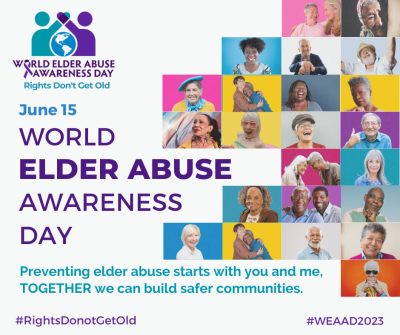Elder Abuse, Fraud & Scams
Elder Abuse
Elder abuse is real and it happens to many seniors. It includes financial or property abuse, psychological or physical abuse, sexual abuse, as well as, negligence and violation of human rights.
Elder abuse is not always perpetrated by strangers with over 90% of all reported cases of senior abuse being committed by a family member. This includes financial abuse, such as depleting joint checking accounts, promising but not delivering care in exchange for money or property, and even outright theft. And it’s not just wealthy seniors who are at risk. Low income older adults are commonly targeted as well.
Protecting Older Adults During the COVID-19 Pandemic and Beyond
In times of disasters, older adults are often among the most vulnerable populations, facing ageist attitudes and policies, and a lack of access to suitable resources and services.
According to the United Nations, older adults are at a significantly higher risk of mortality and severe disease following infection, with those over 80 years old dying at five times the average rate worldwide. An estimated 66% of people aged 70 and over have at least one underlying condition, placing them at increased risk of severe impact from COVID-19.
Older adults may also face age discrimination in decisions on medical care, triage, and life-saving therapies. The pandemic may also lead to a scaling back of critical services unrelated to COVID-19, further increasing risks to the lives of older adults.
Some elders face additional vulnerabilities at this time. The virus is not just threatening the lives and safety of older adults, it is also threatening their social networks and their access to health services.
Online Scams
Join Madison, a Psychology Student at the University of Ottawa and Connexions Volunteer as she chats about the different types of scams and what to do if you suspect a scam.
Related Resources for Fraud
- Sûreté du Québec – Or call 819-770-9111, 310-4141 (to open an investigation into fraud, or contact your local police)
- Canadian Anti-Fraud Call Centre of the RCMP – Or call 1-888-495-8501
- PhoneBusters (Canadian Anti-fraud Call Center) – Or call 1-888-495-8501
- Many banks and other financial institutions have pamphlets and websites about fraud. The Canadian Bankers Association website also has a section on this topic.
- L’Autorité des marchés financiers (Quebec) – Or call 1-877-525-0337.
- Canadian Securities Administrators
World Elder Abuse Awareness Day (WEAAD) is marked each year on June 15th. Under this year’s theme of “Rights Do not Get Old“, WEAAD offers us the opportunity to raise awareness and end elder abuse, as well as honor survivors of elder abuse.

Addressing Elder Abuse
What to do if you suspect abuse:
- Talk to the person being abused. Ask caring questions and don’t impose answers. Listen to the person. Ask them what they want.
- Respect the person’s rights and personal values. They have a right to confidentiality, privacy, and self-determination. Mentally capable adults have the right to make decisions, including choices you might consider risky or unwise.
- Seek consent or permission before taking action. This includes getting consent before sharing the person’s personal stories, financial information, or health information with anyone else. And always look for the least intrusive way to offer help.
- Call the Ligne Aide Abus Aînés toll-free helpline at 1-888-489-2287 for support and a listening ear. If the situation is dangerous, don’t hesitate to call the police or 911.
- DO NOT confront or accuse the abusive person. They may take it out on the older adult.
- Avoid ageism. Do not let ageist or discriminatory thinking affect your judgment. Avoid stereotypes about older people. Respect the dignity of all people, regardless of their age. Learn what you can do about ageism.
- Get informed. Know that abuse and neglect can happen anywhere and by anyone. Learn the warning signs of abuse. Learn what you can do to help, and what the law says you must do when someone’s safety is at stake. If you’re not sure what to do, or if you need support, remember to call the Ligne Aide Abus Aînés toll-free helpline at 1-888-489-2287.
What are possible signs of abuse?
Some warning signs of a senior being abused can include:
- Changes in mood (depression, fear, anxiety or detachment);
- Changes in behaviour (social withdrawal);
- Physical harm (unexplained injuries);
- Neglect (lack of hygiene, food, clothing);
- Failure to meet financial obligations or unusual bank withdrawals; or
- Changes in living arrangements (people moving in or being forced out).
Abuse Prevention
By staying involved with friends, family and within your community, you are less likely to be abused. Staying active and involved also helps you stay healthy. Here are some things you can do to look after your overall well-being:
- Stay connected. Be in regular contact with those who support you and respect your decisions.
- Get involved. Find organizations in your community that offer activities and events where you can meet people.
- Reach out to others. Help to make a more caring community.
- Have fun. Do things that give you enjoyment, strength, and comfort.
- Stay physically active. Keep moving, eat regularly and choose healthy foods.
- Pay attention to your finances. Be involved in and aware of what is happening with your money and belongings. Protect your right to make your own decisions.
- Get support. If you feel depressed, talk to a friend or a close family member or seek-out a social service organization in your community. You don’t have to be alone with problems. Don’t be afraid to ask for help.
You have a right to be treated with respect, to be safe and to make your own choices!
Related Resources for Elder Abuse
- Info-social, 8-1-1, option 2: Connects you to a qualified social worker 24/7, who will evaluate the situation and direct you to the appropriate service.
- Aide Abus Aînés is a bilingual, confidential help line and referral service for seniors who are victims of exploitation, abuse or neglect, and their families, friends, neighbours and the general population. Call 1-888-489-2287.
- Commission des droits de la personne et des droits de la jeunesse (Human Rights Commission) is an organization that makes sure the protections in the Quebec Charter of Human Rights and Freedoms are respected. The services of the Commission are free. Call 1-800-361-6477.
- Crime Victims Assistance Centre (CAVAC) help crime victims and their families. It is not necessary to file a complaint with the police to use their services. Services are provided by professionals and are confidential and free of charge. Call 1-866-532-2822.
- S.O.S. Violence conjugale – Or call 1-800-363-9010
- Éducaloi’s online legal information: Protecting Seniors from Exploitation and Abuse and Seniors: A Short Guide
Related Resources for Computer Security:
- Government of Quebec: Notice on Internet Fraud
- Sûreté du Québec, RCMP and other partners: “Internet 101“.
Related Resources for Consumer Rights:
- Office de la protection du consommateur – Or call 1-888-672-2556 (consumer protection bureau)
Sources: Much of the information on Elder Abuse is adapted from Neighbours, Friends and Families for Older Adults, the Canadian Centre for Elder Law‘s, the Canadian Network for the Prevention of Elder Abuse and the World Health Organization.
Become a Member & Stay in the Loop!


Connexions Resource Centre promotes the health, social wellbeing and vitality of the English-speaking community through empowerment, participation and collaboration within the Outaouais.
Main Office
Satellite Offices
Shawville: 530, rue Main, Shawville, Qc, J0X 2Y0
Wakefield: 721, chemin Riverside, Wakefield, QC J0X 3G0
Important Links
